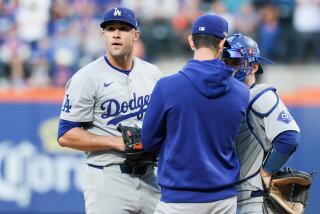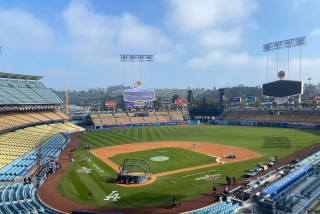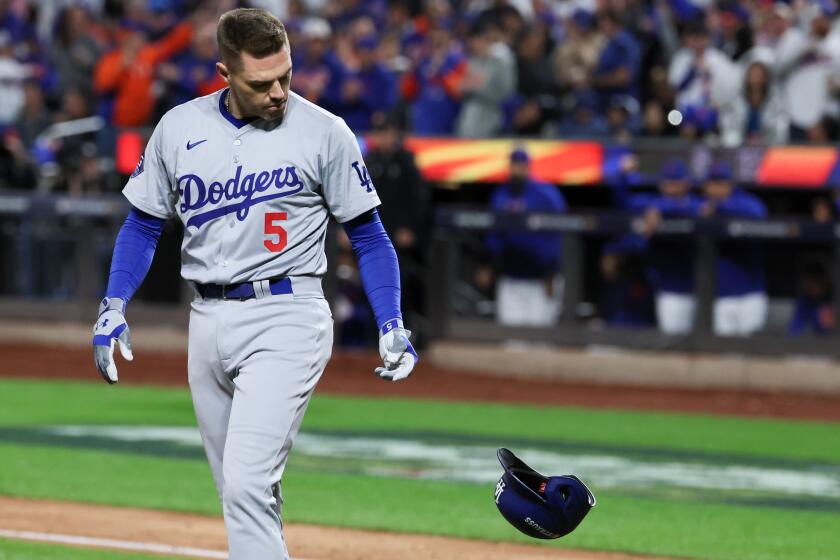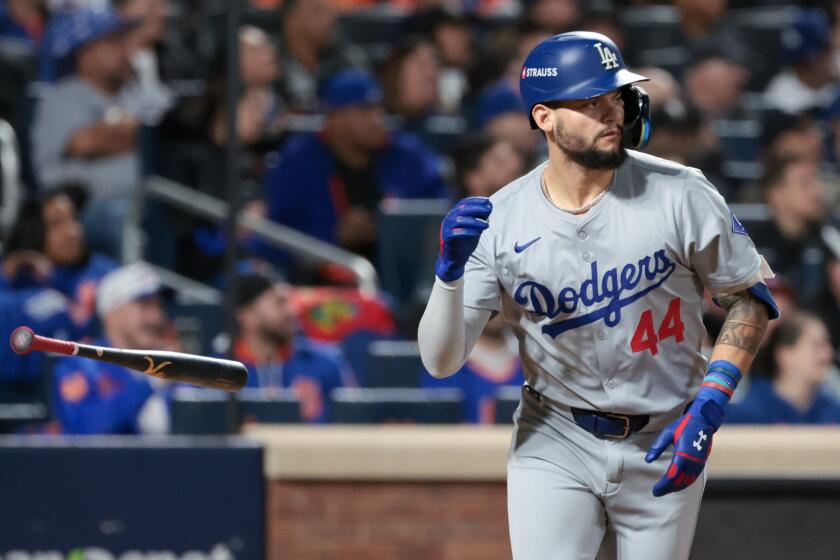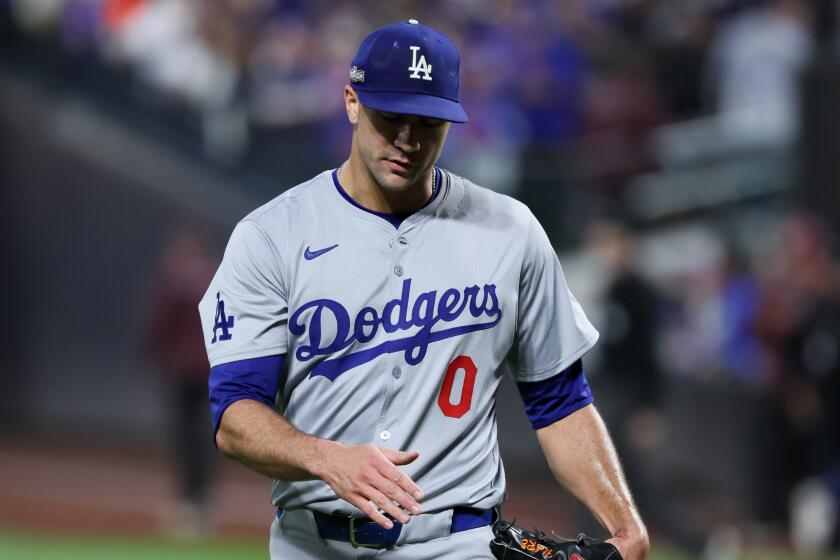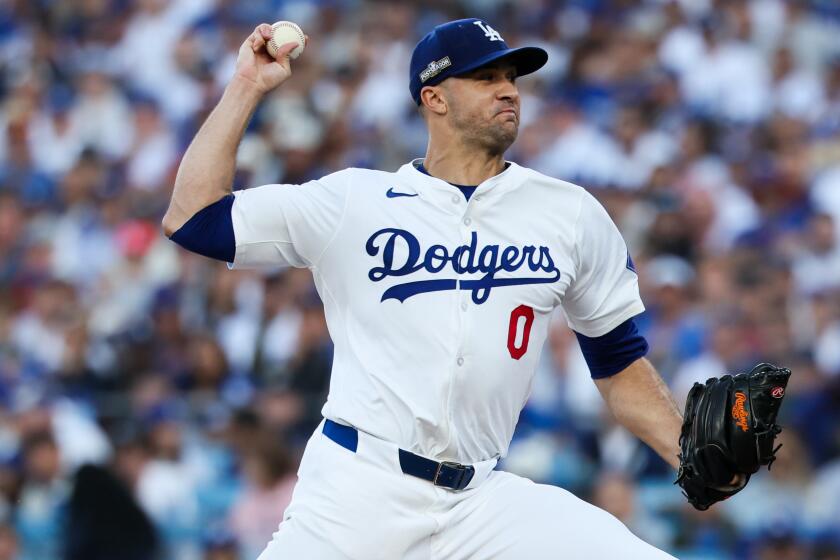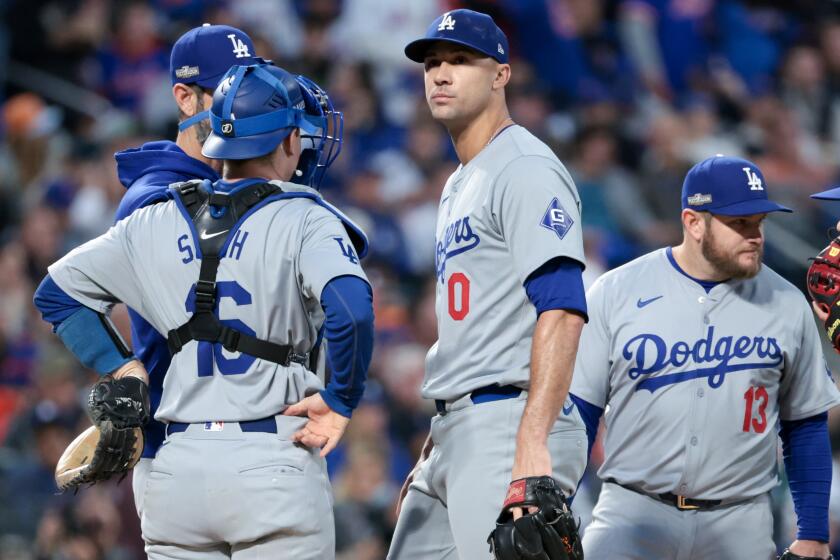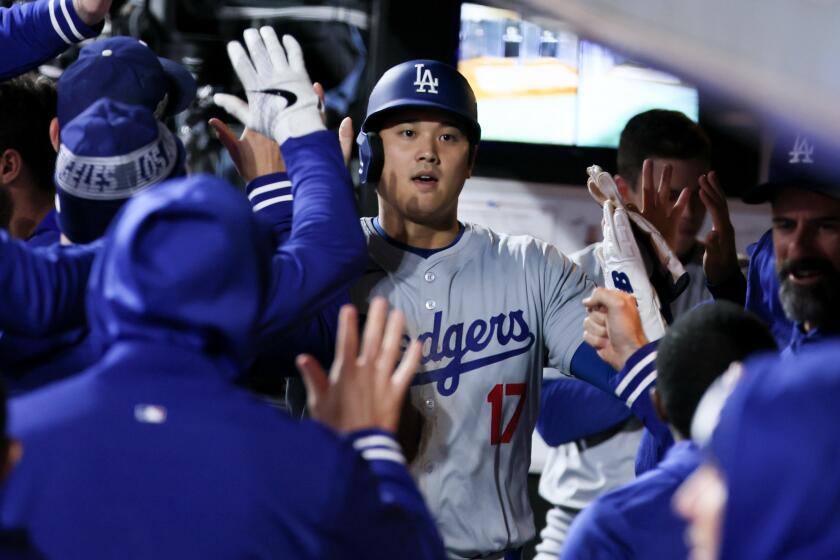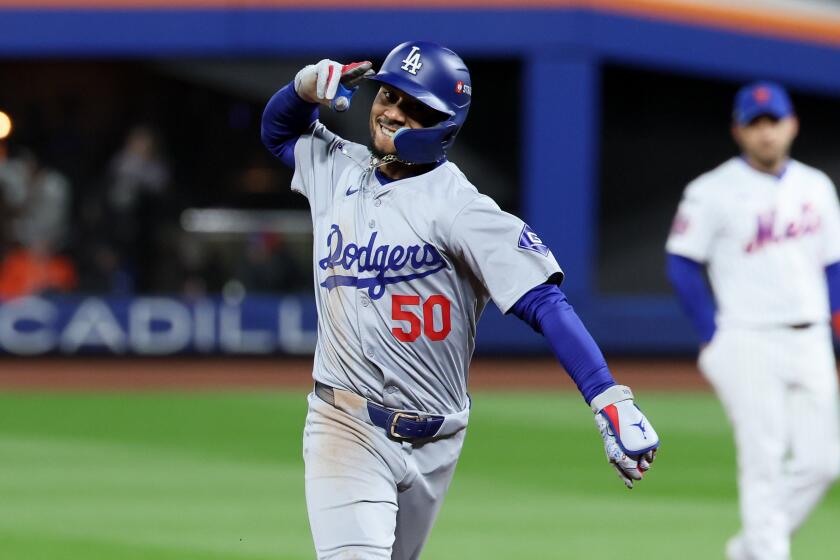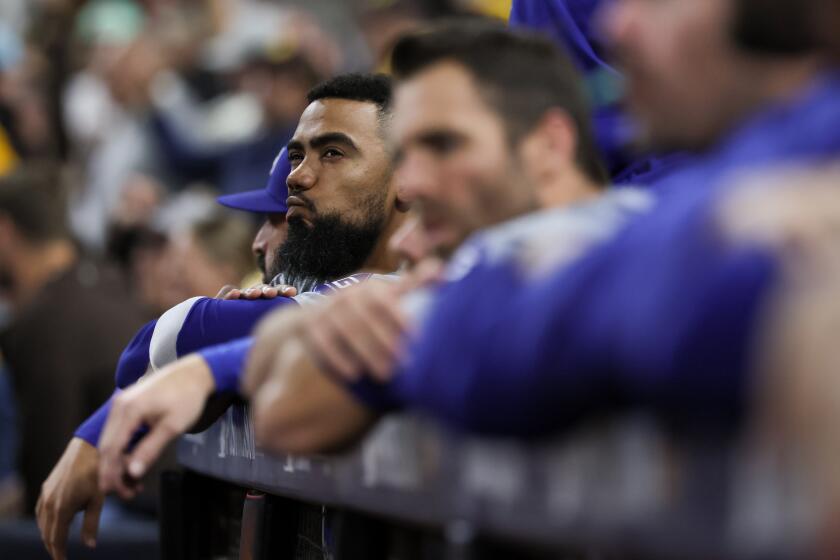Now It’s Umpires Being Replaced : Baseball: Regular season could open without regulars, who want a 41% raise.
Replacement umpire Bob Homolka shouldn’t have trouble keeping track of the count if he’s working behind home plate. He is a college math professor.
But will fellow National League replacement umpire Wade Ford, a Texas state trooper, fall back on old habits and fine pitchers whose fastballs exceed 55 m.p.h.?
Homolka and Ford are among more than 70 recruits--32 in the National League and about 40 in the American League--who have been umpiring spring training games in place of major league umpires, who were locked out by owners.
If a new collective bargaining agreement isn’t agreed upon before Tuesday’s opener between the Dodgers and Florida Marlins, regular-season games will be umpired by replacements.
Umpires missed a couple of games on opening day in 1991, but their longest absence came in 1979, when they missed spring training and the first 45 days of the season while on strike. Replacements also worked seven games of the 1984 playoffs.
Talks between Richie Phillips, head of the umpires’ union, and Robert Kheel, the owners’ negotiator, have taken place throughout the week. It’s unclear, however, whether an agreement can be reached in time for major league umpires to be in place--and prepared--for next week’s openers. They haven’t worked since August, when players went on strike.
Owners originally offered a cost-of-living raise, increasing it Wednesday to 10%. But that’s far from the union’s proposed 41% raise. Umpires’ salaries range from $60,000 to $175,000.
The replacements have worked exhibition games without major problems, spokesmen for both leagues said. But no one knows how they will fare in the regular season, where they might face large, hostile crowds or angry managers and players.
“The effect will be immediately known,” said Brian Gorman, who has three seasons’ experience as an NL umpire. “Those guys are not major league caliber. They’re minor league guys and a few major league guys who are retired. They’re beer league guys.
“There’s nothing worse than a game that’s poorly officiated. Most people say when you don’t recognize the officials, that means they’ve done a good job. With major league umpires, the games are smoother and more enjoyable. They’re not enjoyable when there’s controversy involved.
“Most of these guys got released at the minor league level, so how are they going to be good enough in the major leagues? I spent 10 years working 140 games a year to get to this level. Most guys don’t work anywhere near that number of games. It will be chaos.”
Ricky Clemons, a spokesman for the National League, and Marty Springstead, supervisor of umpires for the American League, said the replacements have been adequate in spring games.
But for Springstead in particular the subject is touchy. If he criticizes the replacements, he might undermine their confidence. If he praises them, he might alienate the major leaguers and create a bitter atmosphere when they return.
“It’s very tough to comment from the standpoint that we haven’t gone to the big games yet,” he said. “Probably, the quality has been as we need.
“The biggest difficulty is reaction time, reacting to a situation as quickly as our people do. These guys almost have to think before they react. But experience in anything will help and can help you get over it.”
The American League wouldn’t release its replacement roster, but Springstead said their backgrounds resemble those of the NL replacements. They include college umpires and former major league umpiring hopefuls who were released after they spent 10 years in the minors.
No top minor league umpires were recruited, in part to avoid repeating the ugliness created in 1979. Eight replacements were retained when the regulars returned, but all were ostracized by their colleagues. Two who are still umpiring in the American League, John Shulock and Derryl Cousins, are still shunned by other umpires.
Some subs haven’t worked in a while--the last assignment listed for Scott Graham of West Chester, Pa., was umpiring in the International League in 1979 and ‘80--but others are active in the Big Eight, Big West, Western Athletic and Eastern College Athletic conferences. Jim Garman of San Pedro and Larry Randall of Long Beach umpired in the 1991 Freeway Series during a work stoppage by umpires that was resolved before the season.
“What also made it tough is we had to get guys who could get off work and not every guy can do that,” Springstead said. “If you can’t make the commitment, you can’t do it, and you don’t know how long to tell these guys they have to commit. It might be three games; it might be three weeks. We tell them all not to quit their jobs.”
Tom Hammill, editor of Referee magazine, believes most fans would see a difference between replacements and regular umpires “only in their imagination,” but said players “would probably notice some difference.” Hammill, whose publication is read by 35,000 officials of amateur and professional sports, said some prospective replacements are “very fine college umpires,” but declined to identify which he rated the best.
“One of our people was down in spring training and thought by and large they did a decent job, but you can’t compare these guys with major league umpires,” he said. “It has nothing to do with pitches or safe and out. It’s people issues. What do you do if Jose Canseco says, ‘Blah, blah?’ Do you throw him out? Maybe it’s accepted for a player to talk to an umpire, but how far does it go? These guys don’t know.
“They’ll be getting acclimated to a new environment. A guy might have worked the College World Series, but that’s not like working in front of 55,000 people at Shea Stadium. Some of them have worked college games and can handle balls and strikes and safe and out but they’ve got no bank account, so to speak. Every other umpire comes with 10 to 12 years’ experience. These guys might have some credibility, but they don’t have that experience and they’re not accepted by the players.”
Gorman said he didn’t resent players’ crossing umpires’ picket lines. He was encouraged to see Canseco joined a picket line last week at Ft. Myers, Fla.
“I don’t believe we’ve asked them to honor our lines. They’re separate unions,” Gorman said. “They are supporting us verbally. A lot of people perceive animosity between the groups, but there’s not. We need them, because we’d be out of a job without them, and they need us because they need quality officiating.”
If he needs someone to defuse a heated situation, Hammill said he would choose Texas lawman Ford. But taking charge of a tight game is another matter.
“He’s certainly used to dealing with angry people,” Hammill said, “but he may not be a good umpire.”
More to Read
Are you a true-blue fan?
Get our Dodgers Dugout newsletter for insights, news and much more.
You may occasionally receive promotional content from the Los Angeles Times.

